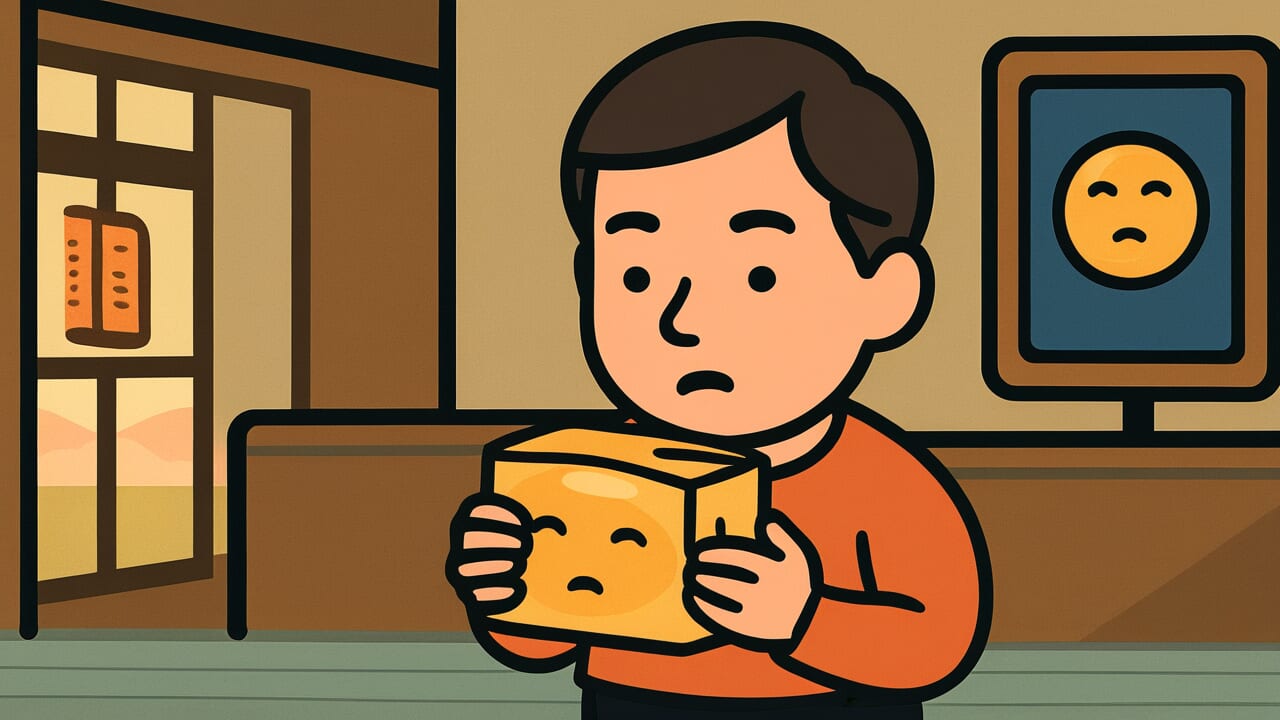How to Read “Feelings matter more than the mochi you ate”
くうたもちよりこころもち
Meaning of “Feelings matter more than the mochi you ate”
This proverb teaches that spiritual fulfillment matters more than material satisfaction. Eating delicious mochi and feeling full is certainly nice. But feeling that someone cares about you and values you brings even greater joy.
People use this saying when receiving gifts or when someone shows them kindness. It reminds us that touching someone’s thoughtfulness and sincerity leaves a deeper impression than receiving expensive things.
Modern society often chases material wealth. But this proverb reminds us that true happiness comes from a fulfilled heart. Physical things eventually disappear. But warm feelings and thoughtfulness live on in our hearts forever.
Origin and Etymology
The exact origin of this proverb in historical texts remains unclear. However, the structure of the phrase offers interesting insights. “Kūta mochi” means mochi you already ate. It refers to material satisfaction from the past.
“Kokoromochi” means your current state of mind or feelings. The contrast between these two concepts is meaningful.
Japan has long valued the spirit of hospitality. In gift-giving and dining situations, people have always treasured the giver’s feelings and sincerity over the items themselves. This proverb reflects that traditional Japanese value system.
The use of past tense “kūta” (ate) is particularly significant. No matter how delicious the mochi was, once you finish eating it, it only exists in memory. But the warm consideration of someone who prepared it for you continues to shine in your heart.
Material things disappear once consumed. But feelings don’t fade with time. This contrast lies at the heart of this saying.
This wisdom likely emerged from everyday life. In times when material goods were scarce, people found value in richness of heart instead.
Usage Examples
- 高級レストランより、母が作ってくれた料理の方が嬉しいのは食うた餅より心持ちだからだろう
- プレゼントの値段じゃなくて気持ちが大事って、まさに食うた餅より心持ちってことだね
Universal Wisdom
Humans are strange creatures. When we’re hungry, we can only think about food. But once we’re full, our interest in food quickly fades. Yet the fact that someone took care of us continues to shine in our hearts long after.
This proverb captures this essential truth about human nature beautifully.
Material satisfaction is temporary. No matter how delicious a meal is, it becomes just a memory once finished. No matter how expensive a gift is, it becomes ordinary with time.
But the thoughtfulness and love behind it never fades. In fact, as time passes, we understand its value even more deeply.
What humans truly seek may not be things at all. We seek the feeling of being valued and cared for. Our ancestors who lived through lonely times understood this well.
They knew that heart-to-heart connections matter most in life. That’s why this proverb has been passed down for hundreds of years. No matter how much material wealth increases, what the human heart seeks never changes.
When AI Hears This
The human brain makes interesting calculation errors. When you receive 1000-yen mochi as a gift, what does your brain remember a week after eating it? Not “1000 yen worth of fullness.”
Instead, it remembers the emotional peak of “they chose this especially for me.”
Behavioral economist Daniel Kahneman discovered the peak-end rule. People don’t remember entire experiences. They remember the moment when emotions peaked and the final impression. The mochi gets digested and disappears.
But the emotional peak of “this person thought of me” gets amplified many times over in the brain’s storage system.
Prospect theory reveals another fascinating aspect called the “reference point.” Humans judge things through comparison, not absolute value. The same 1000-yen mochi has different values depending on how it’s given.
Handed over with no expression versus given with a smile and “I thought you’d like this” creates a 3 to 5 times difference in perceived brain value according to research.
This proverb captures a neuroscience truth. Human memory systems run on “peak emotional moments,” not “total quantity of facts.” The physical value of a gift decays over time.
But the feelings behind it multiply like compound interest in our memories.
Lessons for Today
We live in a materially abundant age. We can easily get what we want and eat delicious food anytime. But that’s exactly why we tend to lose sight of what matters most.
This proverb teaches us that true richness exists in the heart.
When you do something for someone, you don’t need to be perfect. You don’t need to prepare expensive things. What matters is your caring feelings for them.
Homemade food, handwritten letters, a small word of encouragement. The sincerity in these things stays in someone’s heart forever.
At the same time, when someone does something for you, don’t measure it by size or value. Look at the feelings behind it instead. A small kindness might hide great affection.
Living in a way that values feelings enriches your own life too. Things may be lost, but heart connections remain forever.



Comments